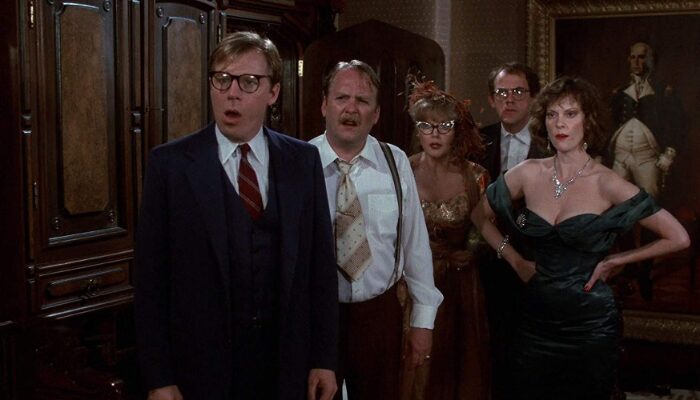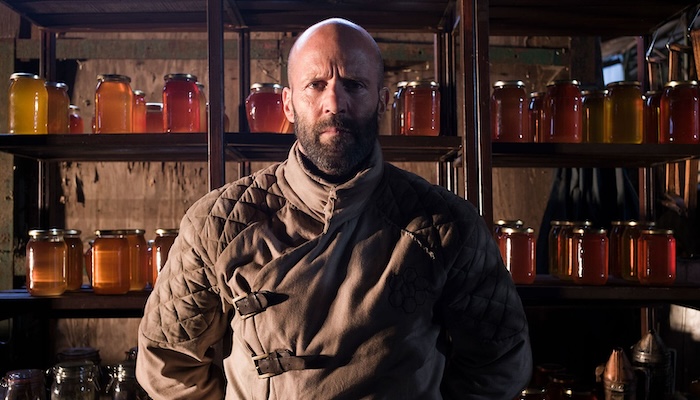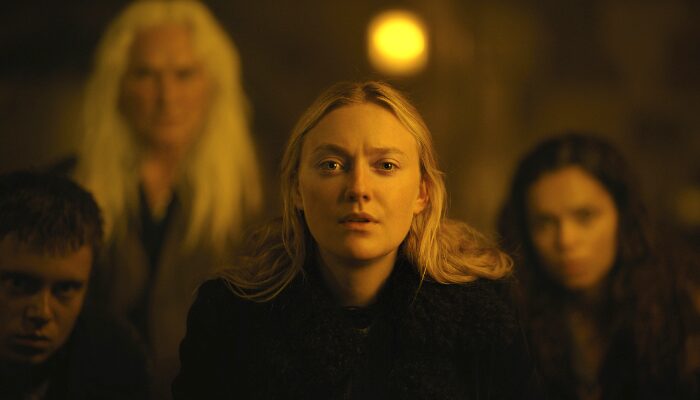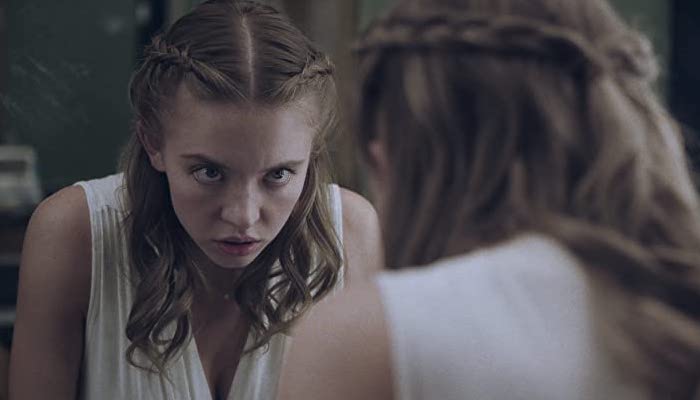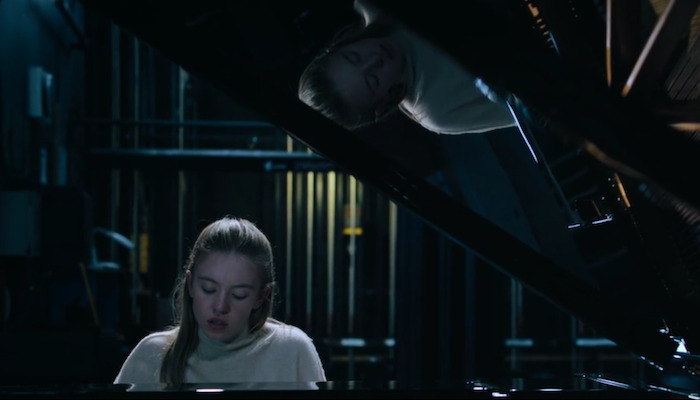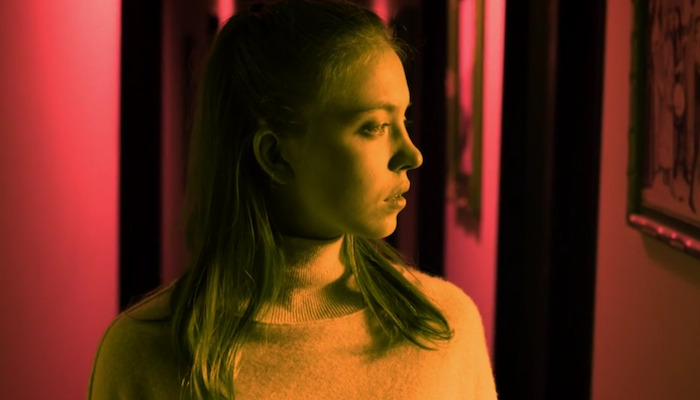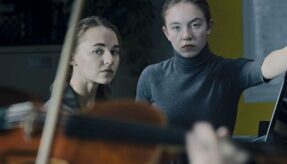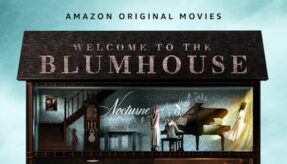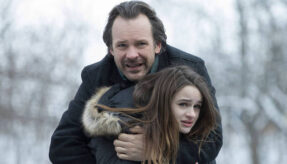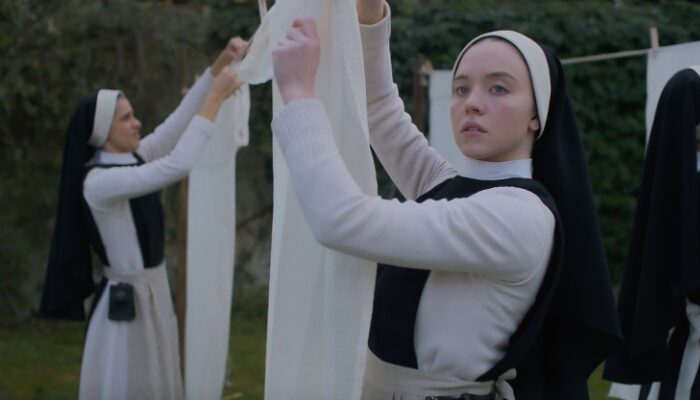Film Review: NOCTURNE (2020): Music and Madness Converge in Zu Quirke’s “Welcome to the Blumhouse” Entry
 Nocturne Review
Nocturne Review
Nocturne (2020) Film Review, a movie directed by Zu Quirke, and starring Sydney Sweeney, Madison Iseman, Jacques Colimon, Ivan Shaw, Julie Benz, Rodney To, JoNell Kennedy, John Rothman, Brandon Keener, Miles McKenna, Stephon Fuller, A.J. Tannen, Asia Jackson, and Phillip Wampler.
In these corporatized times of VFX-laden tentpoles with engorged price tags, the miniscule budgets, smaller scopes, and genre focuses of producers like Jason Blum are becoming ever greater peculiarities. Rather than concentrating the wealth over one single project Blum and his cohorts spread it thin, allowing greater creative freedom in exchange for less financial leeway. Sometimes that strategy works, and sometimes it doesn’t. But, in a culture that’s now comfortable with settling on familiar IPs and means-tested-to-hell products to hit all demographic quadrants, Blum and his Blumhouse label offer a welcome sliver of variety in content, form, and distribution.
This “Welcome to the Blumhouse” collection that Blum has partnered on with Amazon seems to be one such experimentation. If Zu Quirke’s Nocturne is any indication of the collection as a whole, it’s a menagerie of slick 90-minute thrillers with a supernatural bent – compact, not very demanding, but wholly enjoyable nonetheless. And with the focus on character development and rushed lore, it’s perfectly primed for the position of the streaming age’s holiday special – a sort of Tales of the Crypt for modern audiences.
Nocturne in particular is a tale of sibling rivalry, artistic jealousy, and demonic horror rolled up into a stylist ball of dread. Juliet and Vivian Lowe (Sydney Sweeney and Madison Iseman, respectively) are fraternal twins that both attend a prestigious music academy to study piano. Juliet is straight-laced and determined but can never quite reach the same level as the free-spirited and rebellious Vivian, who landed both the solo in their senior class’ spring concert and an acceptance into Julliard. As any ambitious adolescent would, Juliet feels she’s been dealt the short end of the karmic stick, doomed to always be the page-turner to Vivian’s pianist (which we even see acted out in their first rehearsal).
As they begin the final stretch of the semester, Juliet stumbles across an abandoned music theory book with notes on Tartini’s Violin Sonata in G minor . . . a piece colloquially titled the “Devil’s Trill”. In addition to its musical notations, the book – which Juliet learns belonged to a former student who took her life under mysterious circumstances – contains a plethora of strange markings and illustrations, as if scribbled out in a fit of rage. Curiosity overcomes Juliet as she takes up learning the piece, eager to use it as a tool to surpass Vivian’s prowess in the department.
However, the more she practices the more her reality seems to shift. The “lessons” in the book begin looking more like steps – steps to greatness, and the fatal sacrifices needed to reach it – and Juliet is forced to decide if they’re worth following to make it in, per her professor’s (Ivan Shaw) menacing words, this artistic “bloodsport”.
Nocturne’s most-cited comparisons have been to 2014’s Whiplash and 2010’s Black Swan (the former of which is, coincidentally, another Blumhouse release), and they’re not wholly unwarranted. All three films depict the self-tortuous journey of artistic obsession, and the madness that springs forth as one loses all sense of perspective in such a pursuit. The most obvious difference from Whiplash is Nocturne’s supernatural bent, as it equates obsession as literally dealing with the Devil, and what sets it further apart from the fantastical Black Swan is its committal to the metaphor over the surrender to camp.
While at first glance Nocturne’s occultish vibes make it seem less grounded than Chazelle’s bombastic drama, it sort of works to the film’s benefit. Sure, the supernaturalness of the film may put some distance between the audience and their own abilities to interpret the obsession theme, ostensibly rendering a humanistic quality obsolete as nothing but an outside “demonic” force. But doing so also allows for the deleterious side effects of such obsession to be made starkly manifest, without any thematic ambiguity that inevitably leads to dissertations on genius and perfection and (intentionally or not) the idolization of artistic self-immolation.
Nocturne’s metaphor might be a simple one, sure, but Quirke commits to it in an effectively subtle way. That definitely differs from an Aronofsky-like approach, where depictions of literal self-harm and destruction are favored over symbolic ones. Black Swan might go full blend of art-house and exploitation to frame death as the ultimate artistic sacrifice, but for the most part Nocturne keeps the gruesomeness to the metaphysical realm. Its suggestion is that obsession leads not to the death of the body, but rather to the death of character . . . the psyche, or soul if you will. Physical perishment pales in comparison to societal perdition, which is an ultimately quiet and solo struggle.
But enough with the side-by-sides!
Nocturne is strong enough to stand on its own, even if it does feel like the episode in an anthology series that it is. The episodic format does make the film rather light on background and worldbuilding, and the overall story feels a bit rushed – made to fit within that harsh 90-minute cut-off. (Which is odd when you think of the assumed flexibility that a streaming service offers, but maybe not so much if form/distribution take precedent over content in this anthological case.)
However, the smoothness with which Quirke documents Juliet’s descent into obsession is tactful and accentuates the change of character over plot. Quirke and cinematographer Carmen Cabana use lighting and in-camera effects to pull out the dread of Juliet’s obsessive descent, and editor Andrew Drazek uses clever cuts to accentuate her mental tunnel vision. Sweeney herself does a decent job at balancing teenage moodiness with that air of manufactured maturity, showing her desire to be taken seriously in a world that couldn’t care less.
Nocturne may hit the same notes as others that have gone before it, but Quirke plays her feature-length debut with an understated flourish. It’s a small-scale tale of obsession that’s engrossing and competently played. If anything, this is a promising sign – both for Quirke as a director to watch, and for this “Welcome to the Blumhouse” anthology as a delectable genre gathering.
Rating: 7/10
Leave your thoughts on this Nocturne review and the film below in the comments section. Readers seeking to support this type of content can visit our Patreon Page and become one of FilmBook’s patrons. Readers seeking more film reviews can visit our Movie Review Page and our Movie Review Pinterest Page. Want up-to-the-minute notifications? FilmBook staff members publish articles by Email, Twitter, Instagram, Tumblr, Pinterest, and Flipboard.
Related Articles
FilmBook's Newsletter
Subscribe to FilmBook’s Daily Newsletter for the latest news!

